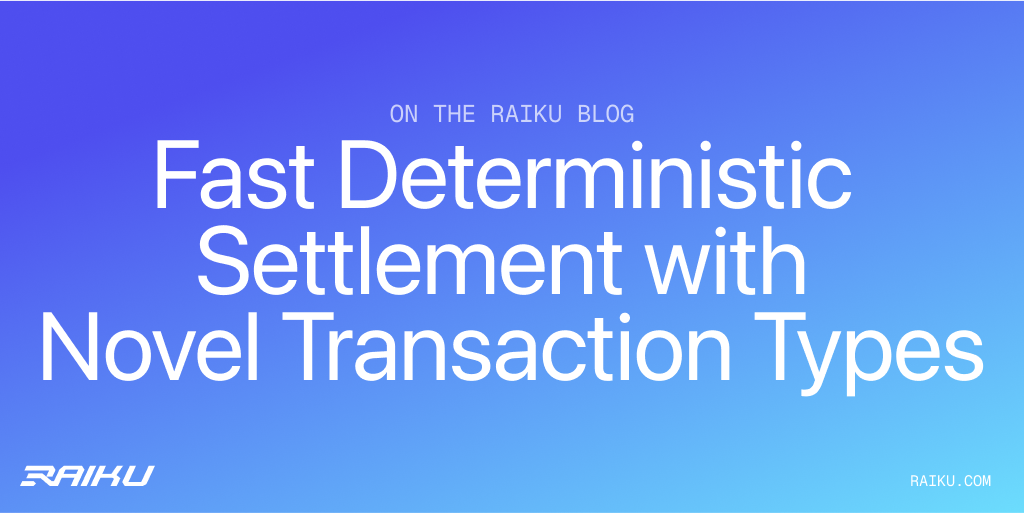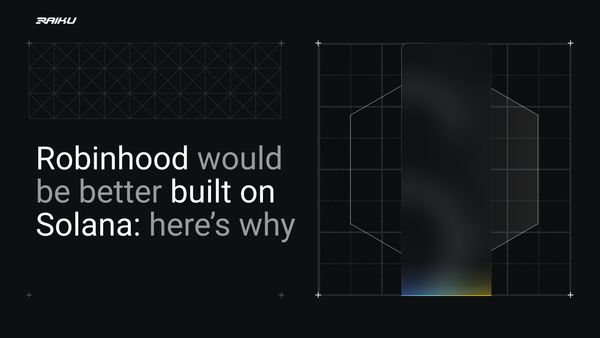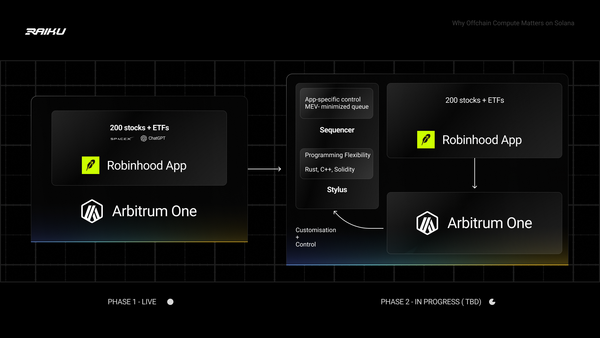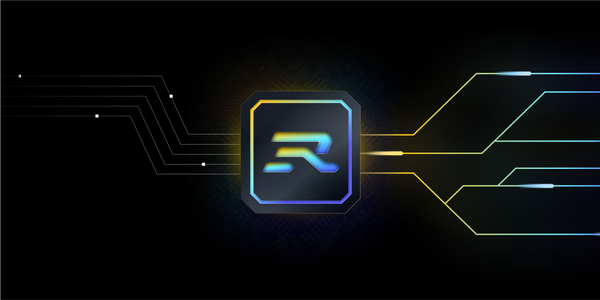Fast, Deterministic Settlement with Raiku’s Novel Transaction Types

Solana has cemented its position as a high-throughput, low-latency network, made to handle thousands of transactions per second with low fees. Consumer applications, institutions, and enterprises are all choosing Solana as the blockchain for mass adoption.
When Solana experiences unprecedented volume, however, there is often a high rate of failed or dropped transactions. In December 2024, Helius estimated that the overall revert rate for all non-vote transactions was 41.2%. A large portion of the network’s computing resources are consumed by processing failed arbitrages, and this high percentage of dropped transactions is frustrating for users and builders alike.
As demand grows, applications are further forced to compete for congested blockspace (against other legitimate operations and against spam transactions). This lack of reliability and lack of predictability prevents institutions and enterprises from considering a blockchain like Solana.
Critical operations can never move onchain without resource access guarantees. They need consistent, deterministic results regardless of network conditions. They need guaranteed transaction inclusion within defined time windows.
If the next evolution of Solana includes high-throughput apps, regulated finance, and AI infrastructure, these bottlenecks need to be addressed.
Raiku’s Product Offerings
Raiku enables Solana-native and external applications to be exponentially more performant, reliable, and scalable to meet the growing demands of their end users. Think of Raiku as Solana’s coordination layer, built on top of Solana to offer new application design options for builders alongside new revenue streams for validators.
Raiku introduces infrastructure products that extend Solana’s core functionality, starting with novel transaction types to offer fast inclusion, MEV protection, and deterministic settlement through our validator network.
Raiku offers ahead-of-Time (AoT) block auctions, where applications can reserve blockspace in advance. This separates block construction from block validation to improve efficiency and specialization, while reducing MEV flow (as it's more difficult to predict two days in advance).
Applications receive inclusion signals ahead of time, with deterministic transaction inclusion, sent every 40-50ms (improving to 25-30ms in the future). Currently, the average transaction is soft-confirmed on Solana every 400ms to 2s. This means users from apps adopting the Raiku tx-types are able to get much better transaction guarantees and inclusion times, while also by-passing harmful value extraction (sandwiching, etc) through dedicated transaction lanes powered by the slot-inclusion QoS (siQoS) mechanism.
For teams building payment infrastructure, the north star is always fast settlement with zero payment failures. Ahead-of-time block auctions ensure that your transactions are guaranteed to go through, even during periods of peak network congestion.
Data Streaming (or Proof Streaming) enables applications to stream large transactions to Solana for verification and settlement. Off-chain event processing can submit proofs that verify state transitions on the base network. This overcomes the challenge of fitting large cryptographic proofs into Solana’s transaction spaces, while maintaining their correctness and soundness.
Imagine multi-model AI workflows that require synchronised inference from specialized models, made possible by Raiku’s guaranteed response timing & micro-second precise execution.
Novel transaction types and Raiku’s AOT block auctions are already available in Raiku v1.
Current Status: Raiku v1 on Testnet
We deployed Raiku v1including our modified validator (sidecar) and the ackermann-node coordination network on Devnet in December 2024.
It has been running continuously and incident-free since launch, validating our implementation model for Ahead-of-Time (AOT) block auctions, inclusion signals, and fast transaction inclusion.
We are actively onboarding validators to the network: register to join the testnet here.
What’s in Store for Raiku v2
Raiku v2 introduces extended functionality including:
- Bandwidth Markets (and Raiku’s Slot Marketplace) for reserving and distributing validator bandwidth through discrete execution windows (slots).
- Global Account Module for representing and managing accounts across external environments (extensions) and underlying native account state, with support for VM instructions like EVM & MOVE.
- RFQ Liquidity, an off-chain component that connects native and external apps with capital markets, enabling access to deeper and more efficient liquidity than traditional on-chain AMMs.
We’re expecting to release Raiku v2 on testnet in Q2 or Q3 2025, so stay tuned for more updates. Raiku v2’s public testnet phase will act as the bridge between our private validator testing and full-scale mainnet deployment—offering broader access to builders and protocol integrators.
It’s the Raiku Moment, Join us
Raiku brings production-ready infrastructure to support high-performance applications, enabling the next generation of scalable, composable, and deterministic systems on Solana.
Builders develop applications with direct validator communication channels, which provide them with deterministic settlement, robust protection against front-running and MEV exploitation, and lightning-fast execution.
In exchange, validators have new revenue streams & fairer transaction processing opportunities while maintaining the base network’s security guarantees.
We’re able to build a new class of applications on Solana for high-frequency trading, payments, AI infra, real-world data streaming, and more — together.
It’s a Raiku moment. Only possible on Solana.
Follow us at @raikucom on Twitter/X.
Join the Discord to keep updated with the latest from Raiku.
If you’re building on Solana and want to push the boundaries of what’s possible, we’d love to hear from you.



